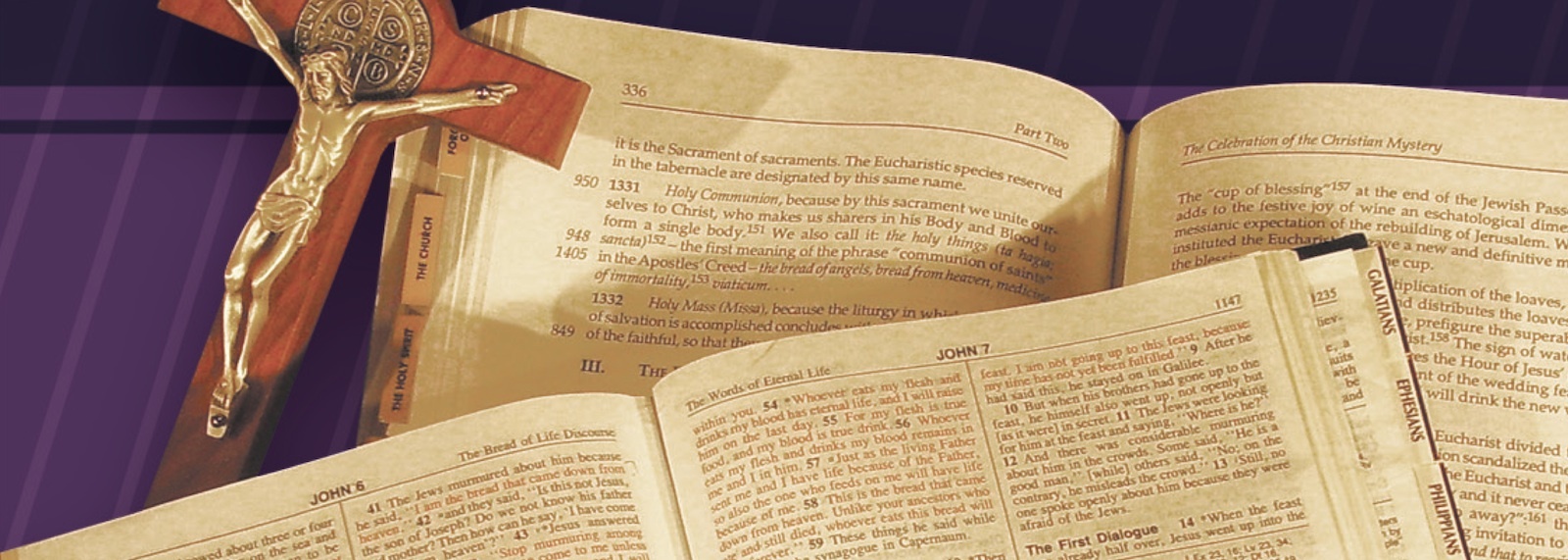Episodes

Thursday May 14, 2015
To Bring about the Obedience of Faith, Romans 16:1-27
Thursday May 14, 2015
Thursday May 14, 2015
How does Saint Paul, as apostle and missionary bishop, warn the Christians in Rome (where he has never visited) to only follow teachers who proclaim “the doctrine which you have been taught” and to avoid those “in opposition to” this apostolic tradition? This needs tender care because, though he knows personally faithful leaders in Rome, he has only heard rumors about the bad teachers. To name these people “who create dissensions and difficulties”, he would have to depend upon second-hand rumors. So, as a wise bishop, he first gives a long list of faithful Christian leaders they can trust, then warns them generally to avoid those who teach otherwise. All of this—all of the book of Romans—has been to “bring about the obedience of faith.”

Wednesday May 06, 2015
Romans 15 & 16
Wednesday May 06, 2015
Wednesday May 06, 2015
As St Paul closes his letter to the Christians at Rome, he first tells them of his desire to finally come an see them. However, he first has another task: to take the alms collected from several churches to help the struggling Christians in Jerusalem. In this we hear our call own call to comfort and support - our responsibility to - our Christian brothers and sisters to whom we are united in baptism. We also hear St Paul affirm how important it is for us to pray for one another - his ministry and each of ours depends upon our shared prayers for one another. We then hear about all the faithful friends Paul had in Rome, through whom he had become aware of the needs of the Christians in Rome. He talks about multiple churches and even a women whom he called a deaconess. What do these references mean for us today? This is what discussed today on Deep In Scripture.

Wednesday Apr 29, 2015
Chain Reference Bible Study & Paul's Reasons For Writing, Romans 15:14-33
Wednesday Apr 29, 2015
Wednesday Apr 29, 2015
In this section, St Paul moves on from deeper theological and ethical teachings to discuss why he has written so boldly to the Roman Christians, why he has not visited them, but why now he plans to do so. In these verses, we hear allusions to the power of the mysteries, or the sacraments as they will be called: to the changes that he as a bishop can assume are true in the lives of all baptized Christians; to his responsibilities as an “ordained” missionary bishop; and to the liturgical sacrifices of the Eucharist. Paul confesses that all that he has written them and all that he has accomplished throughout his missionary journeys is not the result of his own efforts, but what Christ has wrought through him. He is merely seeking to be obedient to Christ and his calling, and this will now mean, God willing, taking the gospel to the ends of the earth.
Email: Dear Marcus and Ken, an Evangelical friend of mine studies his Bible every day, using a chain reference technique. He goes from one verse to the next following references in his chain Bible. Is this a valid trustworthy way of studying God’s Word? Thanks, Sam

Wednesday Apr 22, 2015
Is Faith Between us and God?, Romans 14:22-15:13 , Romans 14:22-15:13
Wednesday Apr 22, 2015
Wednesday Apr 22, 2015
Email: “On Easter, the Epistle reading included: ‘If then you were raised with Christ, seek what is above, where Christ is seated at the right hand of God” (Col 3:1). I know we admit to believing this in the Creed, but what does it mean, ‘seated at the right hand of God?”

Wednesday Apr 22, 2015
Romans 14
Wednesday Apr 22, 2015
Wednesday Apr 22, 2015
Again, following St Paul's instructions to transform our thinking (Rom 12:1,2), this requires examining our lifestyles down to most simple habits of eating and drinking. The truth is, in many ways our Christian Faith frees us up from the scrupulous and over-zealous legalism of many well-meaning religious people. Many build their faith upon life-constricting regulations that have no basis in Scripture or the teachings of the church. Yet, what is our responsibility before these well-meaning "weaker" brothers and sisters? Should we ignore their scrupulous irises and flaunt our freedoms? What if it is their misinterpretations of our freedoms that holds them back from coming home to the Church? This is what we discuss today on DIS.

Friday Apr 10, 2015
The Christian and the Governing Authorities, Romans 13:1-14 Continued
Friday Apr 10, 2015
Friday Apr 10, 2015
In Romans 12:1,2, St Paul calls Christians to continue their conversion by transforming their minds—and not conforming to the world, or the culture around them. In chapter 14 we see that this involves trusting that God is in control of our Country, our government, and its leaders, to whom we are to submit. But what if the laws they have passed are contradictory to the moral laws of our faith? Must we submit? This is part of what we discuss today on DIS.
EMAIL:
Dear Ken and Marcus, how do you juxtapose these exhortations by Saint Paul with the fact that many of the earliest Christian martyrs, whom we are called to emulate and honor, died specifically because they were refusing to be subject to Rome? Thanks, Steve.

Thursday Apr 02, 2015
Romans 13:1-14
Thursday Apr 02, 2015
Thursday Apr 02, 2015
Today’s email points to the need the Church to instruct us on the seriousness of scriptural exhortation like those of St. Paul, including those we will discuss today from Roman's 13. All of this relates to salvation, and to verse 13:14: "But put on the Lord Jesus Christ, and make no provision for the flesh, to gratify its desires.

Wednesday Mar 25, 2015
Question About the "Pillar & Bullwark" and Romans 12:9-21
Wednesday Mar 25, 2015
Wednesday Mar 25, 2015
Email: Mr. Grodi, I have heard you quip many times & in your books that when Scripture says (1 Tim 3:15) that the pillar and bulwark of the truth is the Church, Jesus could not have meant the thousands of denominations divided by contrary interpretations of Scripture we now have in our world, for how could an invisible church of faithful believers be the pillar and bulwark of anything? This may sound reasonable, but if this seeming disunited diversity is contrary to God’s will, then why does God continue to bless hundreds of thousands of non-Catholic Christians? Why does He continue to use these non-Catholic Christian traditions to inspire and evangelize thousands of people every year around the globe out of darkness, into faith in Jesus Christ, away from sin, into prayerful, devotional lives, and even out of secular lives into lives dedicated to ministry? With so few people worldwide converting to the Catholic Church, it appears God is quite willing to work with a universal invisible church just as it is? Thank you, Aran.

Wednesday Mar 11, 2015
"Do not be conformed to this world but be transformed", Romans 12:1-8
Wednesday Mar 11, 2015
Wednesday Mar 11, 2015
Some key points in today’s passage:
- (vs. 1) The idea of “sacrifice” is still very much an important aspect of our Christian faith;
- (vs. 1) Our entire person—body and soul—is our personal share in the daily sacrifice of the Body of Christ; “what we do in the body” daily, as St. Paul say elsewhere, is how we “suffer with Christ”; (Col 1:24; Rom 8:17; Phil 1:29);
- (vs. 2) This requires a transformed state of mind, living out the Our Father;
- (vs. 2) By doing this, our conscience is formed by the indwelling Holy Spirit;
- (vs. 3-5) Behind these verses, is St. Paul assumption of the Mystical Body of Christ: through baptism believers become united with Christ and one another in the Church;
- (vs. 3-5) Living together in the Body requires living out the Beatitudes: detachment from world, sin, self;
- (vs. 6-8) This also requires that we recognize the importance of being a faithful individual in the Body of Christ, yet using our individual gifts to work together for the building up of the Body (Eph 4)
Email: Dear Ken & Marcus, last week you discussed Rom 12:2, “Do not be conformed to this world but be transformed by the renewal of your mind, that you may prove what is the will of God, what is good and acceptable and perfect.” In your discussion you didn’t address what Paul meant by being able to “prove” “what is the will of God, and “what is good and acceptable and perfect.” This term, “prove”, would seem to imply that this process would help one “know” clearly what God’s will is. Yet, in my experience, I’ve known many many faithful Christians—Catholic or non—who have dedicated their lives to doing this very thing, yet they can’t seem to agree on what God’s will is for lots of things. What does Paul mean here?

Thursday Mar 05, 2015
Emails on the Justice of God and "Be Transformed,"Romans 12:1-2
Thursday Mar 05, 2015
Thursday Mar 05, 2015
Some key points in today’s passage:
- The idea of “sacrifice” is still very much an important aspect of our Christian faith;
- Our entire person—body and soul—is our personal share in the daily sacrifice of the Body of Christ; “what we do in the body” daily, as St. Paul say elsewhere, is how we “suffer with Christ”; (Col 1:24; Rom 8:17; Phil 1:29);
- This requires a transformed state of mind, living out the Our Father;
- This requires living out the Beatitudes: detachment from world, sin, self (verse 12:3);
Emails:
- Will there be entry into heaven for a person who has committed a mortal sin without going to confession? This person believes he only has to confess this grievous sin to God. Jay ____
- Dear Marcus Grodi, can you respond to my intellectual dilemma. It deals with the justice of God. What do you consider a more radical punishment: hanging or spending eternal in hellfire? If you say spending eternity in Hellfire, than consider any of your friends or family who are not practicing Christians: giving their lives do any of them deserve hanging? If not, than how can we justify God condemning them to eternal Hellfire? Thanks, Fred

